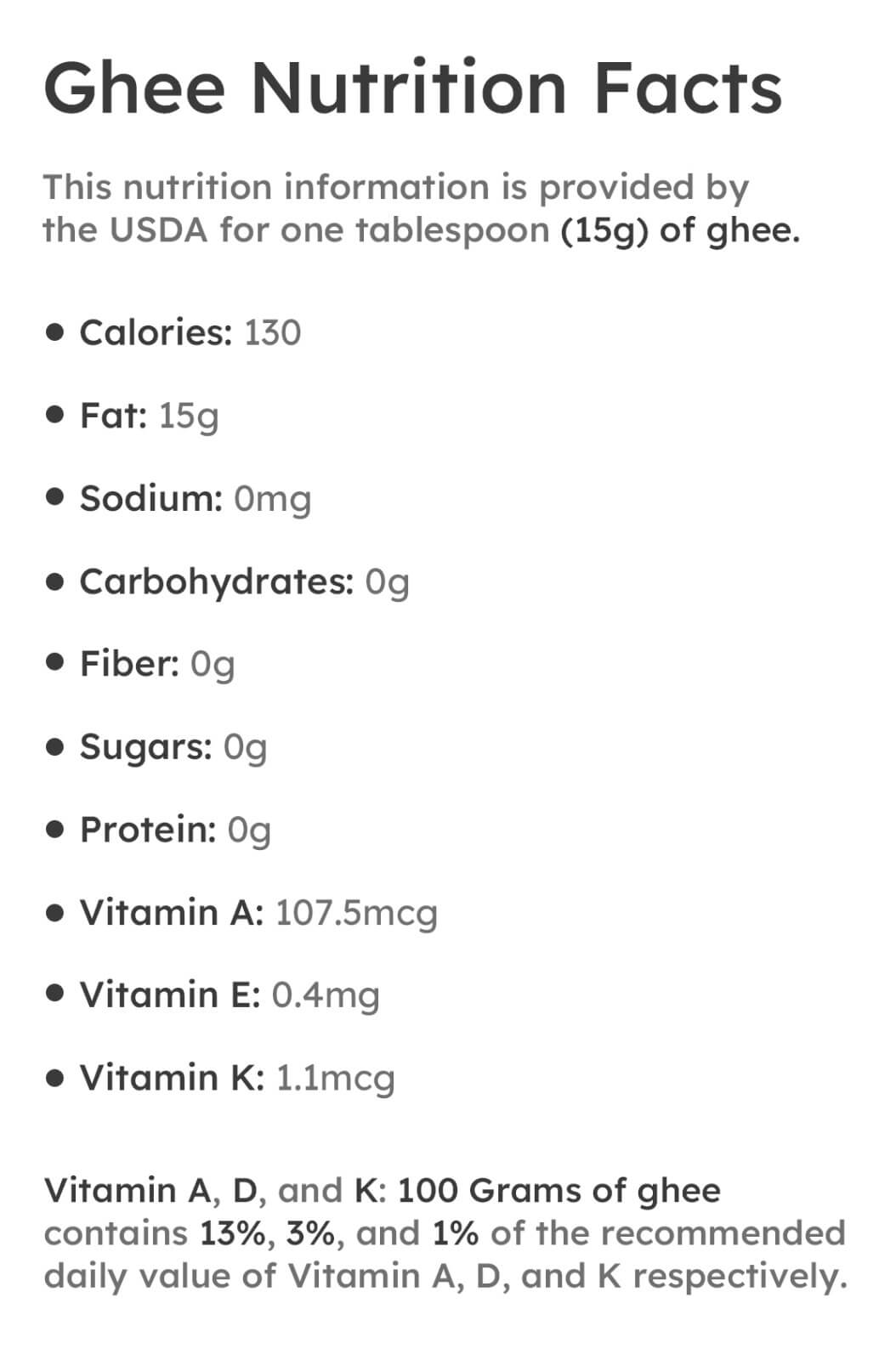Can a Diabetic eat Ghee? Find out!
Ghee or clarified butter is a common food ingredient in Indian household. It’s likely to be used in one out of the two meals prepared through the day at an Indian household. You can have ghee with a piece of bread, roti, stuffed parathas, dal, etc. It’s nutritious.1
Not just food, it has been traditionally used during worships while offering prayers to deities. So, it’s safe to say ghee holds a strong value for people in India. Given the widespread use in Indian cuisine and culture, can a diabetic eat ghee?

Nutritional value of ghee

Ghee is a store house of nutrients. It contains -
1. Vitamin A, D, and K: 100 Grams of ghee contains 13%, 3%, and 1% of the recommended daily value of Vitamin A, D, and K respectively.2
2. Butyric Acid: Butyric Acid in ghee aids in improving gut health. 3
3. Linoleic Acid: Linoleic Acid aids in improving digestion and metabolism. 4
While the above nutrients are excellent, ghee is also loaded with other polyunsaturated fats that are good for health.
Ghee & Diabetes: Can a diabetic patient eat ghee?
Ghee is loaded with nutrients. However, the major concern for diabetic patients while choosing their foods is Glycemic Index. High Glycemic Index foods tend to increase the blood sugar levels in blood, which can complicate health conditions. Low Glycemic Index foods on the other hand are a preferred choice among diabetic patients as they slow down the release of glucose and stop blood sugar levels from spiking up.
Ghee combined with other food items tends to lower the glycemic index of the meal. This helps diabetic patients in managing their blood sugar levels. So, if you’re wondering can a diabetic patient eat ghee? Then, yes. A tablespoon of ghee in a diabetic patient’s meal would go a long way in managing their blood glucose level.
Cow Ghee Vs Buffalo Ghee: Can a diabetic eat cow ghee?
Another question that people with diabetes often have is: can a diabetic eat cow ghee? Nutritionally, cow ghee is more preferrable over buffalo ghee as it is richer in minerals and vitamins. Buffalo ghee is a little harder to digest than cow ghee. So, people with low metabolism may prefer cow ghee over the other. Since glycemic index for both is nearly same; they both aid in lowering the glycemic index of overall meal. So, choosing one type of ghee over another is a matter of other reasons.
Daily limits of ghee for diabetic patients
Recommended daily intake of ghee for diabetic patients is 1-2 tablespoons. Overindulging in ghee may cause problems for diabetic people by raising their cholesterol levels. This however can vary depending on the health conditions of the individual. So, speaking to physician is the best way to find out your recommended daily limit of ghee.
Risks of over consuming of ghee for diabetic people
Though ghee is a store house of nutrients, and an elixir for people with diabetes it comes with its fair share of down sides too. Ghee contains significant of saturated fats, which can cause heart diseases. Over consumption of ghee may increase levels of LDL, which may lead to cardiovascular diseases. Senior citizens with multiple chronic conditions such as, hypertension and diabetes, or high cholesterol and diabetes, should take doctor’s advice before indulging in ghee. This is especially important in elder care and palliative care settings, where dietary choices must be carefully managed.
You might also like to read : Eldercare tips on diet for a healthy life
FAQs
Q1. What is the best time for consuming ghee?
Ghee can be consumed during anytime of the day. However, if you’re suffering from a chronic condition such as diabetes, high cholesterol, etc. please seek your physician’s advice.
Q2. What is the recommended amount of ghee for a day?
A tablespoon of ghee in a day is good. However, the amount of ghee a person can consume in a day can vary on the person’s health conditions. Please seek your physician’s advice before overindulging in ghee.
Q3. What are the ill effects of eating ghee?
Ghee contains significant amount of saturated fats, including Low Density Lipoprotein (LDL) cholesterol. If ghee is consumed in excess, cholesterol levels can increase and lead to obesity, BP, and other cardiovascular diseases. Eating ghee can also cause vomiting, diarrhea, and other symptoms.
Q4. Which ghee is best for people with diabetes?
Cow and buffalo ghee both are good for people with diabetes. Cow ghee is however preferrable among people for its easy digestibility and richer nutrition.
Q5. Does ghee increase heart problems?
Consuming moderate amount of ghee in food is healthy. However, over consumption of ghee may cause heart problems by increased cholesterol levels.
Q6. Is ghee rich in protein and carbohydrates?
Ghee has nearly zero protein and carbohydrates. The energy in ghee comes majorly from fats; it’s a rich source of healthy fats.
Q7. Does ghee raise insulin?
Ghee has a low glycemic index. So, it doesn’t raise insulin as much as high glycemic index foods like White bread, white rice, etc. Moderate amount of ghee in food is recommended for diabetic people, as it slows down the release of glucose in the blood.
Q8. What is the difference between butter and ghee for a diabetic person?
Ghee and butter are both good for a diabetic person if consumed in moderation. However, people with diabetes should be mindful of eating both as they’re saturated fats.
Q9. Is it safe for a diabetic person to consume organic ghee?
Eating ghee with food in moderation is recommended for people with diabetes.
Q10. I am diabetic type 2. Can I eat butter and pure cow’s Ghee?
Both ghee and butter are good sources of healthy fats. Their glycemic index is low. So, both are recommended for diabetic people, Type 1 and Type 2 as well.
Q11. Can diabetics eat butter?
Yes, diabetics may consume butter since it has a low glycemic index, but they should know that they should take it in a restricted form, such as 1 teaspoon or 1/2 tablespoon, and that they should avoid eating it at night; it is preferable to have it for breakfast or lunch.
Q12. What kind of butter can diabetics eat?
This butter should be unsalted and natural, since it reduces blood sugar surges, and other salted market butter contains transfat and saturated fat, which lower HDL cholesterol levels and increase LDL cholesterol levels, which is not good for heart health.
Q13. Who should avoid ghee?
Ghee is beneficial to health, but it has restrictions. If a person has severe digestion or stomach troubles, it may be difficult for them to digest ghee, so they should consume it in moderation.
Individuals who have liver or spleen problems should avoid eating a lot of ghee.
Q14. Does Cow ghee increase cholesterol?
Cow ghee does contain cholesterol: Around 0.32% of its composition is cholesterol. However, it's important to understand the different types of cholesterol and how they affect your health.
There are two main types of cholesterol:
• LDL (Low-Density Lipoprotein): Often called "bad" cholesterol, high levels of LDL can contribute to plaque build-up in arteries, increasing the risk of heart disease.
• HDL (High-Density Lipoprotein): Known as "good" cholesterol, HDL helps remove LDL from your blood, potentially reducing heart disease risk.
References:
1. https://fdc.nal.usda.gov/fdc-app.html#/food-details/1103844/nutrients